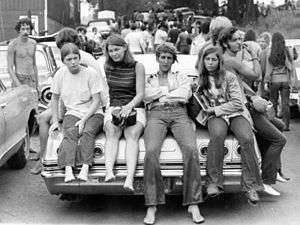V-pop
V-pop (Nhạc Pop Việt Nam), is an abbreviation for Vietnamese pop music, is a musical genre covering Vietnamese music from the 1990s to present day.
| V-pop | |
|---|---|
| Stylistic origins | Traditional Vietnamese • Ballad • Disco • Rock • Pop • R&B • Hip hop • Latin • Techno • Contemporary Folk Music • Romance • New wace • Classical music • Trap • EDM • Indies • Underground |
| Cultural origins | Inspired by American popular music in the South Vietnam (1960s-1970s) |
| Typical instruments |
|
Etymology
In the years 1960s to 1970s, V-pop was limited to Nhạc trẻ Sài Gòn (Youth music of Saigon) or Kích động nhạc (Exciting music). After 1975, the name nhạc trẻ (youthful music) continued to be used as a name for Underground music, which encompasses vibrant, fun folk songs, that were banned by the government of the time. In the 1990s, the phrase Nhạc nhẹ (Soft music) appeared when Vietnam was opening up to the world. Nhạc trẻ (Youth music) was used until the early 2000s, until the name V-pop, based on names such as K-pop, J-pop, C-pop, etc, was mentioned in early 2005. The Hallyu Wave in Vietnam further popularised the name.
History
Domestic
Origins

Vietnamese pop music was influenced early on by the large U.S. military presence in South Vietnam. Much of the music retained its traditional instruments, with the exception of war songs and war anthems. V-pop was not as renowned during the war, as most music would consist of patriotic music, war songs, or songs from the U.S.
On 30 April 1975, Saigon fell, and as a result the Vietnam War ended and some South Vietnamese citizens evacuated to other countries. Popular music released up to that day (dubbed "yellow music") was then prohibited due to its sentimental and sympathetic nature. Music that was patriotic and followed a traditional revolutionary theme (dubbed "red music"), as well as folk songs, had "good values," and were encouraged by the Communist state. However, South Vietnamese classics (dubbed "Nhạc trẻ") continued to survive in overseas Vietnamese communities, where it remained until eventually being reintroduced back to the mainland.
1980s-1990s
In 1986s, after the Đổi Mới reformations, "V-pop" made a gradual recovery. The music at that time, mainly produced by Trinh Cong Son, continued the traditional "love and war" theme. This historical genre gradually lost favor by the early 1990s, around the similar when the Soviet Union had collapsed.

By 1995s, multiple restrictions were being lifted and diplomatic relations with Western-aligned countries improved. V-pop returned to a more steady path compared to its tumultuous period during and prior to the Vietnam War. In 1997s, the Làn Sóng Xanh ("Green Wave") Awards were founded to push the development of the music industry. Singer, Lam Truong, produced, "Tình Thôi Xót Xa" . He was popular amongst the young people of Ho Chi Minh City. This marked a strong beginning for the domestic music market during the development of modern Vietnamese music.
2000s
_(Crop).jpg)
At the beginning of the 21st century, a series of singers (such as Hong Nhung, Thu Phuong, Ho Quynh Huong, My Tam, My Linh, Thanh Lam, Phuong Thanh, Dan Truong, Thanh Thao) emerged, creating music hits that were characterically light, vibrant and youthful. Singers such as Bao Thy, Khoi My, Toc Tien, Huong Tram, Soobin Hoang Son, Son Tung M-TP, Noo Phuoc Thinh further popularised R&B tunes across the country.
Numerous artists such as My Tam, Ho Quynh Huong, My Linh, Thanh Lam, Hong Nhung, Phuong Thanh, Dan Truong, Thanh Thao, Ho Bich Ngoc emerged from Vietnam and started to produce EDM, pop music, R&B, rap, ballad, and other genres. A large majority of V-pop was influenced by K-pop, C-pop, J-pop and Western music. During this period of cultural expansion, a number of foreign artists had also worked with Vietnam's emerging industry (4Men, Super Junior, Lee Young Ah). A large amount of modern music acts emerged such as Bao Thy, Dong Nhi, Noo Phước Thịnh, Quang Vinh, whom of which were all associated with the R&B genre.
The Asia Song Festival (Festival of Asian music), created many opportunities for cultural exchange between multiple participating countries. Artists representing Vietnam included My Tam (2003), My Linh (2004), Ho Quynh Huong (2006 & 2008), Lam Truong (2007) and Ho Ngoc Ha (2009). Many of these Vietnamese artists hope to grow the entertainment industry by engaging in festivals, shows, etc., in other countries.
2010s
During this period, Vietnamese music competitions also played a huge role in shaping a new wave of Vietnamese artists such as Vietnam Idol, The Voice (Vietnam), Vietnamese Stars, Star Academy (Vietnam).
In 2018, SGO48, a Vietnamese sister group of Japanese AKB48, was released with much acclaim.
A few Vietnamese singers who have wide reaching international acclaim include My Tam, Thu Minh, Ho Quynh Huong, and Sơn Tùng.
V-pop female singers include My Tam, Thu Minh, Ho Ngoc Ha Dong Nhi. Male singers include Dan Truong, Erik and Sơn Tùng. Thanh Bui, an Australian-born Vietnamese singer, participated in Australian Idol.
Overseas
After the fall of Saigon, some artists emigrated. A growing demand for music performed up to 30 April 1975 lead to a re-emergence of the popularity of these songs, which were no longer widely available in Vietnam.
In the early 1980s, the number of foreign record companies specializing in Vietnamese music began to grow. Thuy Nga Centre, Van Son Entertainment, and Asia Entertainment were all companies that have produced many popular Vietnamese songs, and entertainment concert series such as Paris By Night, the Van Son Show, Asia, and multiple others.
Around the 1990s, more young artists began to appear overseas in the international market including Lam Nhat Tien, Trish Thuy Trang, Tuan Ngoc, Bang Kieu and Minh Tuyet. During the 2000s and 2010s, C-pop, K-pop and J-pop had already started to spread to the Western world. K-pop had spread to South East Asia and was a influential turning point for the Vietnamese entertainment industry. Vietnamese pop music began to include traits that made K-pop and J-pop popular such as elaborate choreography and chic fashion, which was a huge departure from the sad, melodic ballads which Vietnamese audiences were more accustomed.
Currently, YouTube is the main platform for international exchange. V-pop has already spread to otrher South East Asian countries. Many MVs have started to trend on Youtube in Western countries in late 2010s and early 2020s. However, sad, melodic ballad songs, such as historical war songs, war movie soundtracks, pre-1975 South Vietnamese pop songs, or musical shows such as Paris By Night are still popular in amongst overseas Vietnamese communities.
Internationally

At the end of 2005, singer My Tam released the album Void. In mid-September 2007, My Linh re-released her three old albums for domestic and international markets, including Made in Vietnam (2003), Chat with Mozart (2005) and Let Love Sing (2006) with the help of Pony Canyon Records (Japan). Made in Vietnam was renamed Radio-I in Japan and was awarded the best album of the month in Nagoya, Aichi City. At the end of 2006, My Tam made her fifth album "Soaring" in Korea and released her album in collaboration with Nurimaru Pictures.
In recent years, V-pop has started to attract more attention from the international community from young singers with innovative new music styles such as Min, Amee, Hoang Thuy Linh, and MONSTAR. Many songs and albums have entered numerous prestigious international music charts. V-pop has gradually become a leader in the Southeast Asian music industry.
Currently the most viewed music video that can arguably be classified as V-pop is a children's song called "Bong Bong Bang Bang" (365daband), reaching more than 450 million views.
In 2019, Son Tung M-TP has collaborated with the rapper Snoop Dogg to release the song "Give It to Me". The Source, called him an "Asian Sensation". World Music Awards dubbed him a Prince of Vpop. Korea's Star News also posted the article and called him a leading voice within the V-pop music industry.
In 2020, during the COVID-19 pandemic, Min and Erik released a music song labelled "Ghen Cô Vy" (Jealous Coronavirus) to encourage people on how to handle the pandemic. The song has become popular for its catchy tunes and for raising awareness in limiting the spread of Covid-19.

